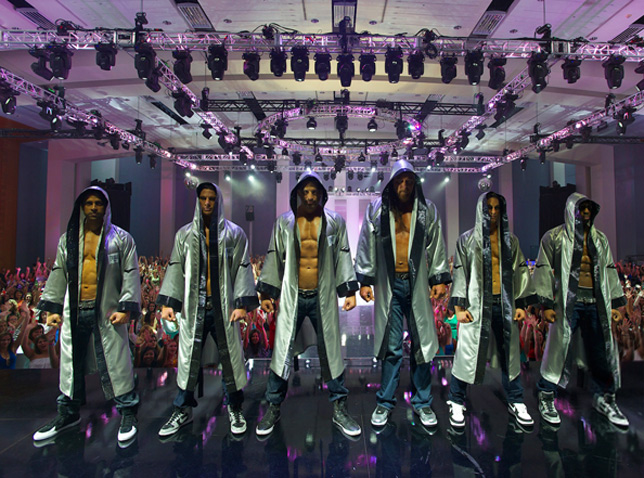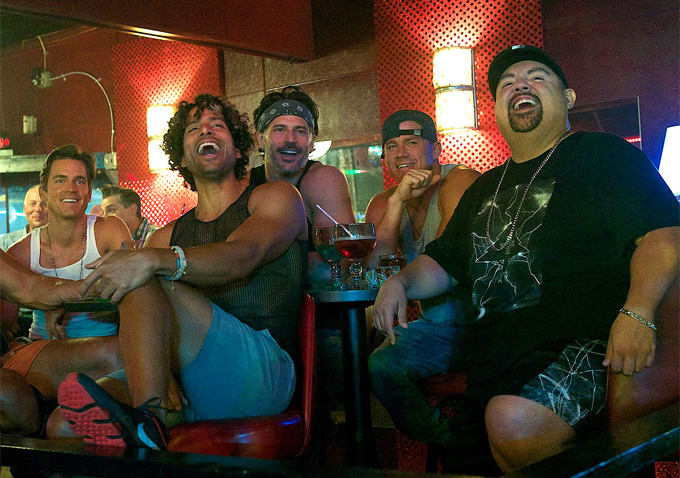By providing your information, you agree to our Terms of Use and our Privacy Policy. We use vendors that may also process your information to help provide our services. This site is protected by reCAPTCHA Enterprise and the Google Privacy Policy and Terms of Service apply.
‘Magic Mike XXL’ Director Gregory Jacobs Steps Out of Steven Soderbergh’s Shadow
Sarah Salovaara

Since serving as assistant director on 1993’s “King of the Hill,” Gregory Jacobs has become one of Steven Soderbergh‘s closest collaborators – perhaps the closest, so long as you rule out Soderbergh’s pseudonymous cinematographer Peter Andrews and editor Mary Ann Bernard. In addition to assistant directing all subsequent Soderbergh titles, including the first season of “The Knick,” Jacobs has also served as a producer or an executive producer on everything from “Solaris” to “Behind the Candelabra,” as well as Doug Liman’s recent hit, “Edge of Tomorrow.”
With “Magic Mike XXL,” Jacobs picks up where his mentor left off, at the helm of one of the most aesthetically entertaining and cunningly clever potential franchises of the aughts. Indiewire spoke to Jacobs about juggling his many hats, working with Soderbergh, and why he was Channing Tatum‘s only choice to direct the sequel.
Since you’ve had such a successful career as a producer and an assistant director, I wanted to start by asking if becoming a director was always your ultimate goal or more happenstance?
It was my ultimate goal. I made movies as a kid, little Super 8 movies with my dad’s camera, and went to film school. I always wanted to make movies, and just sort of fell in as an assistant director and producer. Pretty quickly I realized, though, that I just liked the process of making films. Whether I was the producer or assistant director or writer, it was all interesting to me as long as it was a story I wanted to be part of telling. But the coming out of film school goal was to become a director, yes.
Do you feel that your work as an assistant director has informed how you direct? From having been on sets, the AD usually keeps the director in check and on schedule, so I’m curious if you have an internal clock or improved efficiency as a result.
Well, the last 16 or 17 years I’ve been an AD, and there are a couple things I’ve produced but not AD-ed — like “Edge of Tomorrow” — but generally when I’m producing, I kind of feel like, “I’m going to be standing there anyway, I might as just AD as well.”
I have such a close relationship with Steven [Soderbergh] and I can kind of just nudge it along faster, but I guess there’s a part of me that hates to give up the control of that. The efficiency part of my brain, the AD portion, has definitely helped when I’ve directed because the first film I wrote and directed, “Criminal,” we made in 25 days. Another movie I did, “Wind Chill,” was 28 days; this one [“Magic Mike XXL”] was also 28 days. I haven’t had the 100-day schedule, so I’ve always had to be efficient anyway, and having my AD background has been pretty helpful.
 With “Magic Mike XXL,” you’re given the opportunity to dig a little deeper into the ensemble. Do you feel like constantly being on set and observing how directors work with actors has made it a much easier process for you?
With “Magic Mike XXL,” you’re given the opportunity to dig a little deeper into the ensemble. Do you feel like constantly being on set and observing how directors work with actors has made it a much easier process for you?
Yeah. Even though I fell into the AD thing to pay my rent, it become an amazing graduate film school. I’ve worked with so many interesting filmmakers, and having Soderbergh do so many different kinds of films, whether it’s the “Oceans” movies or “Contagion,” you’re learning a lot and interacting in such a close way with the director and the cast — it’s certainly been very helpful. I’ve been lucky to have a lot of great mentors, Steven being chief among them, and by sheer osmosis almost, you can’t not pick up tips and learn from them.
How are you able to wear your producer and AD hats at once? I imagine because you work with Steven so much and he juggles so many roles on his sets that it perhaps breeds in the environment.
Well, I’m on the phone to the studio in between set-ups. [Laughs.] I think there is an element of ADD to me where I like being busy and filling all my moments with something to do. They’re different, but I like a good puzzle, which is part of being a good AD, and I also like to tell a good story, which is the creative producing aspect. The best assistant directors are really creative problem solvers and good filmmakers in their own right. It’s been a fun, circuitous journey that I’ve been lucky to be on.
At what point did you come aboard “Magic Mike XXL”?
When we were making “Haywire” about five years ago, Channing [Tatum] told me this story about his days as a stripper and that he was trying to make it into a movie, and he asked me to produce it. At the time, there was another director involved, and I said I couldn’t do it, and that I was too busy. Maybe nine months later, he came back and said that the filmmaker was no longer involved, but he’d love it if I could get involved and said that he was thinking about talking to Soderbergh about it. I said, “Oh, you should! I’ve talked to him about it, and he thinks it’s a great idea.” So he and Steven met and agreed to do it together. Immediately, I came on with Reid Carolin, the screenwriter, and Nick Wexler was another producer who was attached to the other version, and we all started sitting down and working through the screenplay together. Reid wrote the script, but we were all part of the original development together.
So when Steven decided he wanted to retire from making movies, it was immediately apparent that you would direct “Magic Mike XXL”?
Yeah. Channing was really great and a big proponent of that. He said, “Look, you have to do it, and I’m not going to do it if you don’t.” And Steven was very supportive of that, too. He was supportive of the story that I latched on to, which Channing and Reid did as well, which was this road trip that the guys would take. The version that I wanted to make involved a little bit of a tonal shift, and Soderbergh was completely on board with that and Chan was very encouraging of me to do it. And I really wanted to. Stuff over the years has come up, and there have been other projects that I’ve worked on, but this was it. I love the guys as people and as characters, and I just felt like I wanted to know what happened to them. I wanted to continue their story, and it was a story I knew I could tell.
 The first film has a very particular color palette, and this one diverges from the look of it a little bit, but did you feel a responsibility to carry that visual style over? What was it like working with Steven as the cinematographer?
The first film has a very particular color palette, and this one diverges from the look of it a little bit, but did you feel a responsibility to carry that visual style over? What was it like working with Steven as the cinematographer?
I thought about it a lot. It had to be the brother of the first movie. I couldn’t throw out the palette, and there had to be some synchronicity in the shooting style. Partially because we had a 28-day shooting schedule, there had to be some Altman-esque quality to staging and shooting. I wanted to continue, to some degree, the visual style, but the fact that we had this road trip device enabled me to be able to make a visual and a tonal shift. At a certain point, we move out of Florida, so the look and the filtration could be different, and I wanted the movie, visually, to feel like you were along for the ride with these guys. It had to have a naturalism to it. Not until we get to the convention at the end, when all bets are off, can the camera move whenever I see fit. It can be our version of the big, splashy, Hollywood-esque convention.
This film has such an emphasis on dance as a mode of storytelling. What was it like directing some of those scenes because you’re juggling so many moving parts?
It was really fun. That was one of the things I was really looking forward to. I was so mesmerized by the way Channing moves. It’s athletic and beautiful to watch. Shooting the dance sequences were some of the most fun days. There were months of pre-production involved in rehearsing and locking in the songs and getting the rights and figuring out the choreography. We had an amazing choreographer, Alison Faulk, and I would meet with her, and sometimes Reid would come along, and we’d read the screenplay and she would have to interpret the script and what we wanted. She’d create these dances, and I’d watch the rehearsals and in the broadest strokes say, “No, I don’t want them on the ground there, can you have them up for that part?” And she’d redesign it. She had weeks and weeks of rehearsal with the guys, and then Steven and I would figure out how to shoot it, because once we got to set, it had to move pretty quickly.
You’ve collaborated with Steven in so many capacities — as co-writers, co-producers, AD-director — was anything different to you about working with him from the director’s chair, and in post, when he was editing?
Every night we finished shooting and would go edit together and it was a blast. It was different, there was definitely a little bit of a role reversal, but it’s great to have one of your best pals there with you and on set. With this movie in particular, I was surrounded by a lot of friends. It was great to have Steven there as my pal, my collaborator, who was supportive of the vision, but in this case if we ever disagreed, I was the one who got to win the arguments. [Laughs].
READ MORE: Watch: The Glorious ‘Magic Mike XXL’ Trailer Has Come
By providing your information, you agree to our Terms of Use and our Privacy Policy. We use vendors that may also process your information to help provide our services. This site is protected by reCAPTCHA Enterprise and the Google Privacy Policy and Terms of Service apply.

















